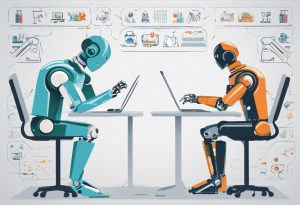Artificial intelligence (AI) has had an impact on almost all industries today. AI-powered technologies have entered every vertical, from medical services to gaming, and from finance to human resources technology. Furthermore, businesses have adopted AI trends after the global pandemic. It is expected to continue in the coming years.
To earn a slice of the huge cake of the digital revolution, organizations must follow the emerging trends of responsible AI, and that’s the only way for them to put one foot ahead in highly competitive markets around the world.
AI Trends in 2024

Here are some key AI trends in artificial intelligence technologies that will emerge in 2024.
AI in Cybersecurity
The increase in global internet usage has made cybersecurity a big consideration for almost all industries. Organizations can use AI to develop new methods that will automate network security.
Data security is becoming increasingly reliant on AI-based innovations that assist businesses in supporting their cloud migration operations while also increasing the adequacy of big data technologies.
Augmented Intelligence
Augmented Intelligence in Al is one of the most prominent emerging trends. It is a combination of humans’ dynamic decision-making power and machine-specialized proficiency that increases productivity. The contribution of digital employees will increase, and IT infrastructure teams will use AI-augmented technologies to improve their IT proficiency.
Healthcare, travel, financial services, and retail are some industries where augmented intelligence is becoming more common with every passing day.
Metaverse and AI
We’re sure you’ve heard of the metaverse, a computerized environment where users can play and collaborate with others digitally. Metaverse is a virtual world where we will have a one-of-a-kind experience. Even though this is a computer-generated virtual world, it appears to be more real than the real world.
It would not be incorrect to refer to the Metaverse as the next Internet generation. The idea went viral when Mark Zuckerberg mentioned assembling it by innovating VR technology with Facebook’s social establishments. It appears that AI will play a critical role in the metaverse environment.
Creative artificial intelligence
It is well-established that AI is used to create music, plays, poetry, art, and computer games. New models such as Google AI and GPT-4 have revamped the limits of outputs and have started producing more intricate results that are more normal and inventive.
No-code or low-code AI
Due to an insufficiency of skilled AI developers, increased costs, etc., businesses usually fail to embrace AI-driven transformations. Organizations can now overcome these issues with low-code or no-code AI arrangements.
You may ask, How? Basically, no-code and low-code AI solutions offer simple interfaces that can be used to create complex AI systems. Users can create complex AI-based designs just by using drag-and-drop functionality.
Internet of Things (IoT) sensors
The widespread adoption of Internet of Things (IoT) sensors is expected to grow significantly. Internet-connected devices have already reached 3 billion by the end of 2023. We can expect more growth this year as well. This exponential growth represents a significant increase from the roughly 10 billion devices recorded recently.
The expansive adoption of IoT sensors across various sectors underscores the transformative impact and widespread integration of connected technologies in our daily lives.
Voice and language-driven Intelligence
AI technology based on voice and language opens the door to next-generation human-computer interaction. According to a recent study by Juniper Research, digital voice assistant utilization reached 8 billion in 2023, marking a substantial increase from the estimated 2.5 billion after 2018. So we can expect more numbers this year.
Increased user demand for personalization
Personalized digital experiences have quickly become the norm, as users expect tailored interactions with brands from all industries. This has resulted in a surge in advancements in Machine Learning (ML) and AI’s predictive capabilities, which are assisting businesses in gathering more reliable user insights.
The accuracy of this technology will continue to improve as users expect more personalized experiences with each digital interaction.
So, what the future holds for businesses?
In the near future, artificial intelligence will be extremely important in accelerating the growth of businesses and industries. Businesses that use AI to improve business functions such as marketing, human resources, sales, IT operations, accounting, administration, and so on can command the top spot in their respective industries.
AI Careers: Navigating AI Trends in 2024

If venturing into AI excites you but pursuing a computer science career doesn’t, here’s good news – many new job opportunities await in 2024, aligning with the latest AI trends.
Beyond the essential roles of engineers and technicians in system building, openings will emerge for prompt engineers who craft instructions for AI applications and AI managers, overseeing virtual worker teams.
The demand for AI project managers, trainers, and ethicists will also surge. For tech enthusiasts, fields like AI engineering and DevOps will continue to unfold promising job prospects in alignment with AI trends.
Ethical AI
The transformative potential of AI necessitates responsible development and usage. Identified concerns such as bias, lack of transparency, job displacement, and the unpredictable nature of AI will persist in 2024.
Ethical considerations will remain at the forefront, prompting an increased demand for AI ethicists. Their role will be crucial in ensuring businesses adhere to ethical standards and implement necessary safeguards in alignment with ongoing AI trends.
Quantum Integration
While not an immediate influence for everyone, quantum computing’s capacity to accelerate computation-heavy workloads is finding applications in AI. Quantum algorithms, leveraging qubits existing in multiple states simultaneously, show superior efficiency compared to classical algorithms.
This efficiency is particularly valuable for solving optimization problems addressed through machine learning. Anticipate progress in applying quantum computing to power larger and more complex neural networks and algorithms, aligning with the ongoing AI trends of 2024.
AI Customer Service
The routine nature of customer service operations positions it as an ideal domain for AI integration. AI’s role will extend beyond automating mundane tasks, revolutionizing customer service by triaging initial contact calls, generating personalized solutions, and summarizing customer interactions.
A recent survey indicates that 95% of customer service leaders expect AI bots to serve customers within the next three years, showcasing the accelerating pace of AI trends in reshaping customer service.
AI Legislation
Acknowledging the transformative impact of AI, legislators are intensifying efforts to develop comprehensive regulations. China has already implemented laws against non-consensual deepfakes, and the EU, the US, and India are formulating their regulatory frameworks.
Expect the UK to propose a new bill in 2024, with an EU act predicted to be in place by the start of 2025. The ongoing debate will revolve around striking a balance between citizen protection and fostering innovation and commerce, aligning with the dynamic AI trends.
AI-Enhanced Applications
Generative AI functions integrated into software and applications emerged as a significant trend in the past year. From search engines to productivity tools and industry-specific platforms, chatbot functionality became a strategic choice for enhancing customer experience.
Data protection and customer privacy concerns are anticipated to be addressed as AI providers adapt their services to market requirements. Adobe’s integration of generative AI into its Firefly design tools serves as an example of addressing copyright and ownership concerns, aligning with the evolving AI trends.
8 Reasons Why Humans Remain Essential Amid AI Trends in the Workplace

While the primary goal of AI is to streamline work processes and enhance efficiency, it is crucial to acknowledge that it cannot replace the indispensable role of human input in the professional sphere.
So, let’s explore why human presence continues to be immensely valuable in the workplace, presenting a compelling case against AI’s complete substitution of humans.
Human Uniqueness in Emotional Intelligence
Emotional intelligence stands as a distinctive trait that keeps humans irreplaceable in the workplace, particularly amidst evolving AI trends. The significance of emotional intelligence, especially in client interactions, cannot be overstated. As social beings, humans inherently crave emotional connections with others, a need that AI struggles to replicate.
AI may attempt to mimic human intelligence, but the nuanced emotional intelligence, involving empathy and a profound understanding of human experiences, remains challenging to duplicate.
Unlike humans, AI cannot genuinely feel emotions such as pain, making the establishment of strong emotional connections, crucial for business growth, a unique human attribute amid AI trends.
AI’s Dependency on Input Data
AI operates solely based on the data it receives, limiting its capabilities to predefined parameters, a factor essential in understanding current AI trends. AI becomes ineffective when faced with uncharted territories or unforeseen circumstances not covered by its algorithms.
Such situations are common in tech and manufacturing industries, prompting AI developers to seek temporary solutions continually. The notion that AI tools can adapt to any situation is debunked, ensuring that AI’s influence does not extend to all industries and that the demand for human expertise remains intact amidst prevailing AI trends.
Human reasoning, analytical abilities, creativity, adaptability, and information-gathering capabilities are challenging for AI to replicate.
Limitations in AI’s Creative Process
AI’s creative prowess is confined to the data it receives, hindering its ability to brainstorm innovative concepts or novel approaches to work within emerging AI trends. The rigid reliance on given templates restricts AI from thinking beyond predefined styles or patterns.
Creativity, a fundamental element in the workspace and relevant in the context of AI trends, injects a sense of novelty and diversity, starkly contrasting the repetitive actions for which AI is designed.
The innate human capability to think outside the box and generate inventive ideas for innovation sets humans apart, as AI lacks the capacity for creative thinking amid contemporary AI trends.
Absence of Soft Skills in AI
Soft skills, encompassing teamwork, attention to detail, critical and creative thinking, effective communication, and interpersonal skills, are essential for professional success, a fact significant in the ongoing AI trends. Humans are not only taught but also required to possess these skills, providing a competitive edge over AI in the workplace.
Soft skills contribute significantly to workplace development and growth, yet they are beyond the reach of AI. Developing these skills necessitates a high level of reasoning and emotional intelligence, attributes inherently human and beyond the capabilities of AI amid ongoing AI trends.
Human Involvement in AI Creation
The existence of artificial intelligence is intrinsically tied to human intelligence, an aspect crucial to understanding the current AI trends. Humans conceive, design, and write the lines of code that shape AI. Humans input the data from AI processes, and humans operate these machines.
As AI applications expand, the need for human involvement intensifies amid emerging AI trends. Someone has to design, create, operate, and maintain these AI systems, tasks exclusively within human capabilities. Therefore, dismissing speculations of AI surpassing humans in the workplace is warranted in the context of current AI trends.
AI as a Complement, Not a Competitor
While AI applications gain prominence in the workplace and may replace certain jobs, particularly those involving repetitive tasks, the idea is not to compete but to complement human abilities and intelligence amid the backdrop of ongoing AI trends.
AI’s influence is primarily on roles requiring less intense reasoning, leaving room for humans to adapt to evolving workplace demands within the framework of contemporary AI trends.
Forward-thinking organizations are already exploring ways to integrate human capabilities with AI, aiming for higher productivity and innovation levels. Rather than anticipating a complete takeover, the focus should be on collaborative work between humans and AI amidst the prevailing AI trends.
AI Requires Human Fact-Checking
AI chatbots, such as ChatGPT, often exhibit inaccuracies and necessitate fact-checking by human moderators, a phenomenon integral to current AI trends. While AI can learn quickly, it lacks common sense and the ability to contest facts to the extent humans can.
This reliance on external moderation highlights the need for fact-checking as a significant career in the future amid evolving AI trends. Human research skills remain indispensable, as AI cannot independently verify information with the same level of discernment.
In the end, tasking generative AI has a long way to go in the context of prevailing AI trends. While we can envision a distant future where AI systems might use automated 3D printers to build homes, the current reality suggests that blue-collar work remains immune to AI invasion.
Conclusion: AI Transformation in 2024
AI is gearing up to handle all those boring and repetitive tasks, giving us humans the chance to focus on more interesting stuff. Yeah, the future is kind of now, and it can feel a bit daunting for some because, let’s be real, change is hard, and not everyone gets what’s going on.
But rest assured, AI is not going to replace jobs anytime soon. So, there is no need to allow the fear of generative AI trends to get to you. Instead, why not welcome AI with open arms? Imagine teaming up with a company that’s like your AI guide into the future.
At Ajackus, we’re all about that! We’d love to show you how we’ve helped our clients bring AI into their businesses, making their lives easier and leaving them more time to rock their operations and get awesome results.
Interested? Let’s talk about it!

Start a Project with Ajackus

































